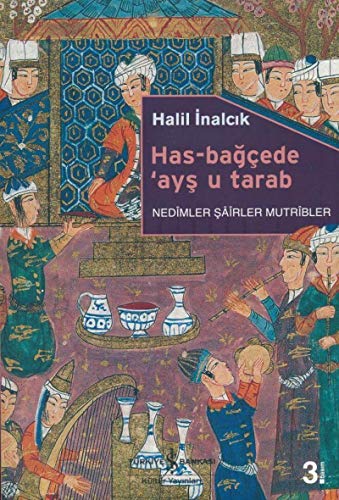has bagcede ays tarab nedimler di inalcik halil (2 risultati)
Tipo di articolo
- Tutti i tipi di prodotto
- Libri (2)
- Riviste e Giornali
- Fumetti
- Spartiti
- Arte, Stampe e Poster
- Fotografie
- Mappe
- Manoscritti e Collezionismo cartaceo
Condizioni
Legatura
- Tutte
- Rilegato
- Brossura (2)
Ulteriori caratteristiche
- Prima ed.
- Copia autograf.
- Sovracoperta
- Con foto
- Non Print on Demand (2)
Spedizione gratuita
- Spedizione gratuita negli USA
Paese del venditore
Valutazione venditore
-
Has-Bagcede 'Ays u Tarab - Nedimler Sairler Mutribler
Editore: Turkiye Is Bankasi Kultur Yayinlari, Istanbul, 2018
ISBN 10: 6053324175ISBN 13: 9786053324171
Da: Librakons Rare Books and Collectibles, Istanbul, Turchia
Membro dell'associazione: IOBA
Libro
Softcover. Condizione: New. 496pp., 23.0x15.5cm., in Turkish. Has-Ba_ade 'Ay_ u Tarab: Ned"mler, poets, mutr"bles in the Ottoman palace of the sultans of the sultans in the palace of the pleasant times and this custom from the pre-Islamic Iranian Empire to the Umayyad, Abbasid and Timuri palaces, extending from the rooted sources written in those periods. He joins with the Nedims, who are close to these entertainments called the Sultan __ret Assembly; Poetry, music, and raks had fun with the most distinguished examples of the arts. These assemblies both reflect and reflect the tastes and lifestyles of the ruler and the elite classes in the empire. Flower gardens, pools, fountains, water channels, sub -nahiller, in the incense, young sk"s in a parliament in a parliament who read poetry, reeds and singing artists who read poetry, was an indispensable tradition in all Middle East palaces. Since the Umayyad and Abbasid periods, these assemblies have been regarded as an indispensable custom of the Levzim-i Sultanate. Regalia, which is the equivalent of this tradition in the European palaces, is considered among the requirements of the reign. Whether in the East or in the West, the palace culture has always been different from the folk culture and this difference is reflected in the tradition of the Assembly of the Assembly and the reactions shown. On the one hand, the opponents of this tradition, which was transferred to the princes through the tulips and to the upper class members through the Sak"nmes and Kar_nmes on the other hand, expressed themselves with ftvvetnmeler. In futvvetnmes, which are the moral books written for the people, the movements against the orders of religion have always been disparaged and wine is considered the main sin. However, it is a duty to reconcile the elements considered to be contrary to religious rules with Islam: In these works, it is always emphasized that the assemblies of the work began with prayer and repentance. Because human beings are weak, sinful, eventually gaffru'l-znb-the south of the forgiveness-takes refuge in the Lord. This work, which was prepared as a contribution to the Ottoman social-cultural history, tries to shed light on the less-known side of the palace and the high class called the lifetime.
-
Has-bagcede 'ays u tarab. Nedimler, sairler, mutribler.
Editore: Istanbul: T. Is Bankasi Kultur Yayinlari, 2016., 2016
ISBN 10: 6053324175ISBN 13: 9786053324171
Da: BOSPHORUS BOOKS, Istanbul, Turchia
Libro
Soft cover. Condizione: New. INALCIK, HALIL Has-bagcede 'ays u tarab. Nedimler, sairler, mutribler. Istanbul: T. Is Bankasi Kultur Yayinlari, 2016. Large 8vo., xvi, 496 p., color ills. Paperback. New ISBN: 9786053324171 CATALOG: Ottoman history KEYWORDS: Ottoman Court Ottoman culture Ottoman classical poetry-Divan literature Entertainment Drink Entertainment Ottoman history Has-Bagcede ?Ays u Tarab: Nedimler, Sairler, Mutribler Osmanli sarayinda padisahlarin has bagcede gecirdigi hos vakitleri ve bu adetin Islam oncesi Iran imparatorlugundan Emevi, Abbasi ve Timuri saraylarina uzanan koklu gelenegini, o donemlerde yazilmis degerli kaynaklardan derleyerek sunan bir calisma. Padisah isret meclisi adiyla anilan bu eglencelere yakin adamlari olan nedimlerle birlikte katilir; siir, musiki, ve raks sanatlarinin en seckin ornekleri esliginde eglenirdi. Bu meclisler, hukumdarin ve imparatorluktaki seckin siniflarin zevklerini ve yasam tarzlarini hem yansitir, hem yeniden bicimlendirirdi. Cicek bahceleri, havuzlar, fiskiyeler, su kanallari, nahiller, buhurdanlar arasinda, genc sakilerin icki sundugu bir mecliste siir okuyan, saz calan, sarki soyleyen usta sanatkarlar esliginde surulen zevk u safa, tum Ortadogu saraylarinda vazgecilmez bir gelenekti. Emevi ve Abbasi donemlerinden beri bu meclisler levazim-i saltanat yani hukumdarligin vazgecilmez bir adeti olarak kabul edilirdi. Avrupa saraylarinda da bu gelenegin karsiligi olan regalia, yani olaganustu ziyafetler ve eglenceler, hukumdarligin gerekleri arasinda sayilmistir. Dogu?da olsun, Bati?da olsun saray kulturu halk kulturunden her zaman farkli olmus ve bu farklilik isret meclisi gelenegine ve gosterilen tepkilere de yansimistir. Bir yandan lalalar uzerinden sehzadelere, diger yandan sakinameler ve kabusnameler yoluyla ust sinif mensuplarina en ince ayrintisiyla aktarilan bu gelenegin muhalifleri de futuvvetnameler ile kendini ifade ederdi. Halk icin yazilmis ahlak kitaplari olan futuvvetnamelerde dinin emirlerine karsi hareketler daima kotulenmis, sarap baslica gunah sayilmistir. Ne var ki, sakinameler ve kabusnameler dini kurallara aykiri sayilan unsurlari Islamiyet ile bagdastirmayi bir odev saymistir: bu eserlerde isret meclislerinin daima Tanri ve Peygamber?e dua ile basladigi ve tovbe ile son buldugu hep vurgulanir. Zira insan zayiftir, gunah isler, sonunda Gaffaru?l zunub gunahlari affedici olan rabbine siginir. Osmanli sosyal-kulturel tarihine bir katki olarak hazirlanan bu eser, sarayin ve ona bagli zarifler denilen yuksek sinifin kendine has geleneksel kulturu ile yasaminin az bilinen bir yanina isik tutmaya calisiyor.


